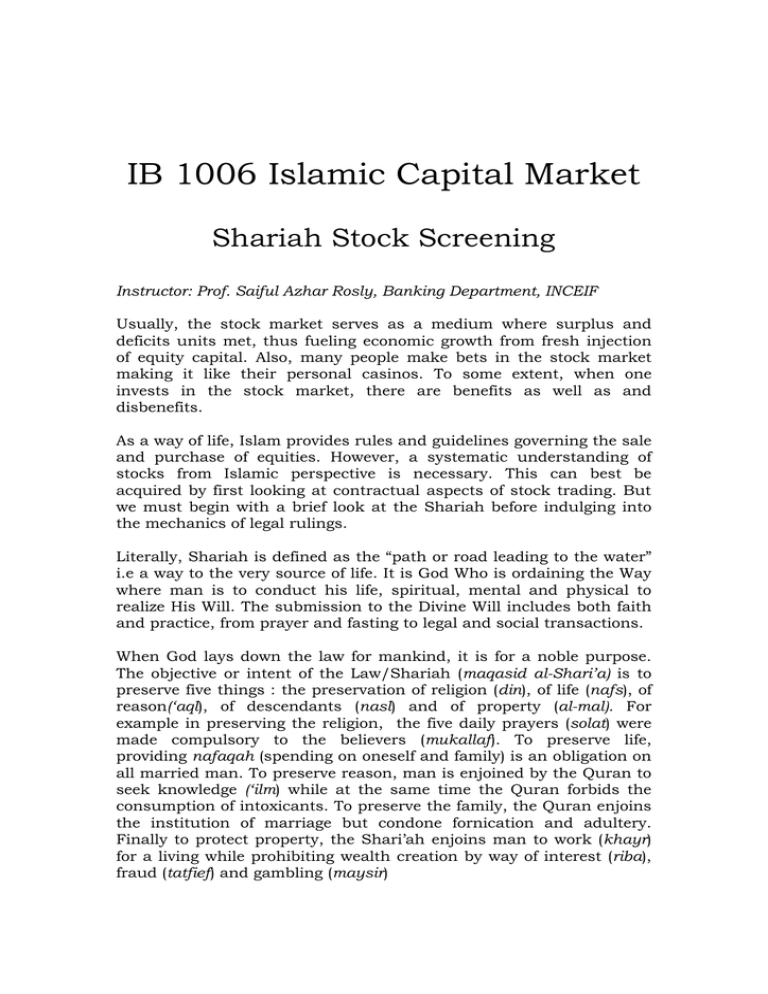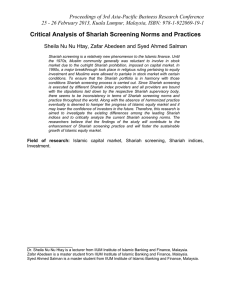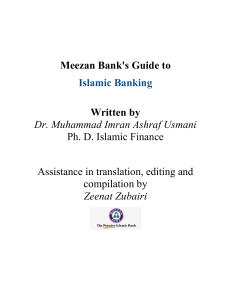IB 1006 Islamic Capital Market Shariah Stock Screening
advertisement

IB 1006 Islamic Capital Market Shariah Stock Screening Instructor: Prof. Saiful Azhar Rosly, Banking Department, INCEIF Usually, the stock market serves as a medium where surplus and deficits units met, thus fueling economic growth from fresh injection of equity capital. Also, many people make bets in the stock market making it like their personal casinos. To some extent, when one invests in the stock market, there are benefits as well as and disbenefits. As a way of life, Islam provides rules and guidelines governing the sale and purchase of equities. However, a systematic understanding of stocks from Islamic perspective is necessary. This can best be acquired by first looking at contractual aspects of stock trading. But we must begin with a brief look at the Shariah before indulging into the mechanics of legal rulings. Literally, Shariah is defined as the “path or road leading to the water” i.e a way to the very source of life. It is God Who is ordaining the Way where man is to conduct his life, spiritual, mental and physical to realize His Will. The submission to the Divine Will includes both faith and practice, from prayer and fasting to legal and social transactions. When God lays down the law for mankind, it is for a noble purpose. The objective or intent of the Law/Shariah (maqasid al-Shari’a) is to preserve five things : the preservation of religion (din), of life (nafs), of reason(‘aql), of descendants (nasl) and of property (al-mal). For example in preserving the religion, the five daily prayers (solat) were made compulsory to the believers (mukallaf). To preserve life, providing nafaqah (spending on oneself and family) is an obligation on all married man. To preserve reason, man is enjoined by the Quran to seek knowledge (‘ilm) while at the same time the Quran forbids the consumption of intoxicants. To preserve the family, the Quran enjoins the institution of marriage but condone fornication and adultery. Finally to protect property, the Shari’ah enjoins man to work (khayr) for a living while prohibiting wealth creation by way of interest (riba), fraud (tatfief) and gambling (maysir) To sum up, the Shari’a is built on two basic principles, namely :the removal of hardship (ra’f al-haraj) and the prevention of harm (daf’ aldarar). This has direct bearing to the Quranic verse that, “God never intended to make religion a means of inflicting hardship (22:78) and “God intends to make easy for you” (4:28). Thus, when the five necessities (darurah) are well-preserved, man’s attention will not go into disarray. By disarray we mean, rejection of Divine values ie. hedonism – ultimate love for wealth and pleasures and the other rejecting the worldly living ie. denounciation of fitrah. On this ground, it is important to note that efforts and policies drawn to conduct Shariah screening on stock portfolios are aimed to preserve and protect the darurah. In general, screening stocks along Shariah values can be made in two ways. a) First, it deals with the nature of contractual agreement (‘Aqd) taking place between the issuing company and investors. b) Secondly, it looks at the nature of production ( ie. Core Screening) and financial activities ( ie. Financial Screening) observed by the issuing party. On the first approach, the trading of stocks in Islam essentially involves the contract of sale (al-bay’) since what is taking place is the exchange of assets (shares) for money. A share certificate is an evidence of one’s ownership of assets. Although the ownership is only fractional but it gives the owners the right to participate in profit making, such as determining company policy by way of appointing company directors. Thus, at one point, selling and buying of shares is associated with buying and selling of assets. However, the type of contracts actually applied in stock trading remains unclear. In the above, the contract of al-bay’ seems fitting since a share certificate is seen to represent assets or property (al-mal) that is taking part the production process. In the contract of al-bay’ the al-mal constitute the subject matter of contract (mahallul ‘aqdi). But in stock trading, no physical transfer of assets from the buyer to the seller is evident. In addition, investors do not really know which particular asset they actually own from the share purchases. Also a person who purchases a common stock does not resemble an ordinary consumer/merchant who buys goods for consumption/ trading purposes respectively. So, using the contract of al-bay’ may not be an accurate one, to say the least. Investment in stocks can also be better understood by way of applying profit-loss sharing principle (PLS). When a company issues a common stock, it does so to obtain risk or equity capital from the public. Investors who took up these shares are willing to assume the risk of losing his capital in a hope to obtain higher returns. Investment in stocks is therefore a profit-loss sharing activity, which Islam rightly enjoins. In share purchases, it seems that the contract of musharakah is more relevant since it deals with partnership in capital. That is, the investors and issuing companies constitutes the equity holders and thus, participated in profit sharing. When the contract of musharakah is applied in stock investment, the spirit of cooperation (ta’awun) requires both investors and issuers to put some degree of commitment in the business ventures. That is, both parties should stay together during ups and downs. To that effect, contra-trading seems to go against the musharakah spirit since this involves exiting the partnership when an opportunity to enjoy a capital gain is sight. In this sense, contra-trading has brought some ethical (akhlak) implications to the musharakah framework. Even though law and ethics do not mix in legal contract, the contract can become voidable if it explicitly specifies the special covenants pertaining to exit policy. In profit creation, Islamic law requires people to participate in risktaking (ghorm). Risk is defined as the variation of outcomes arising from uncertainty. In Islamic law, two popular the legal maxims (Qawaid Fiqiah)are most useful as they highlighted the constructive role of risk-taking in wealth creation, namely: a) No rewards without risks - “Al-Ghormi bil Ghonm” and b) profits must be accompanied with liability “Al-Kharaj bil Daman”. Apart from risk-taking (ghorm), Islamic principles of investment in stocks require companies to produce goods and services that are free from the elements prohibited by the Quran. This is where the second approach to stock screening (also known Core Screening) is applied. The prohibited goods and services are given as follows: a. Interest (riba): contractual increase over capital loan b. Gambling (maisir): speculative or aleatory contracts in which obligations and benefits accruing to participating parties are not fully defined at the time when the contract became effective leading to either wining or losing arising from mere chance instead of work and effort. c. Uncertainty (Gharar): uncertainties that exists in contracts involving contracting parties and the subject matter, which leads to disputes and unjustified gain d. Intoxicants (qamar): consumption of alcoholic beverages, which can impair the intellect (‘aql) leading to irrational behavior. e. Consumption of pork f. Illicit sex (zina) : sexual relation outside marriage which annihilate the sanctity of the family system (nasl). However, there are a number of Shariah approved companies whose activities are not totally shielded from the prohibited elements. To further filter these companies into the Shariah approved list, the Shariah Advisory Council’s (SAC) Core Screening have applied several additional criteria such as: a) The haram activities must be very small compared with the core halal activities. b) The image of the company in the public eye must be good and well-behaved. c) The core activities of the company are important to the economy and considered providing general benefit (maslahah) to the people. d) The haram element must be very small and tolerated on the basis of common plight (umum balwa), custom (‘urf) and rights of the non-Muslim community acceptable to Islam. e) The level of contribution of interest income received from interest-bearing fixed deposits and financial instruments such as bonds, bills and money market instruments must be less than 5% of total revenue. The Shariah Advisory Council (SAC) of the Malaysian Securities Commission has set up a guideline on Islamic stock investment bearing the above information. As of November 2008 list shows that about 80% companies listed on the Bursa Kuala Lumpur are Shariah approved. This encouraging development saw the launching of the Kuala Lumpur Shariah Index (KLSI) in August 1998 to help investors gauge the performance of Shariah-linked counters. Offshore, the Dow Jones and FTSE Islamic indexes provide a wholesome approach to the screening process. Although the two screening approaches are not identical, both observe two main screening process: 1. Core Screening: Here a stock is declared permissible (halal) when the issuing company produces output or products that are free from the prohibitive elements of riba, gambling, intoxicants, pork and pornography. Shariah stock screening by the Securities Commision Malaysia, Dow Jones Islamic Index and FTSE follows these guidelines well 2. Financial Screening: This screening concerns the financial activities of the issuing companies. 1. Income derived from reserves and investment securities must be free from interest. One example is placing reserves in interest bearing bank deposits. Permissibility Rule #1 : The ratio (interest income/ total operating revenue) must be less than 5%. 2. Income receivables must not contain interest (riba). Income receivables are bills owned by customers who buy on credit, which the firm expects to collect in a relatively short time. First the credit sale may require the firm to impute interest charges due to the delay in payments. Second, firms seeking loans may use account receivables as a security. This is known as the assignment of account receivable, in which the payments and receipts of interest as riba has also taken place. Permissibility #2 : (Income receivables / Total asset) ratio must be less than 45% The Dow Jones Islamic Index is the most conservative here. Companies that hold cash and interest bearing securities exceeding 33% of total assets is excluded from the index. 3. Capital structure of a firm is usually composed of debt and equity and measured by the debt/equity ratio. Given a debt equity ratio, one can know the amount of debt the issuer uses as capital. The bigger the ratio, the more dependent is the bank on debt financing with the payments and receipts of interest fully implicated. Full compliance however is not possible today. Islamic scholars have prepared a cleansing or purification system in which the impurities say, riba can avoided by giving it away as charity (sadaqah). In this way, stockholders will not be directly associated with riba or other prohibitive elements accompanying the dividends and capital gains earned from investments, if any. Permissibility Rule #3: Leverage factor, a debt/capitalization of less than 33%.


